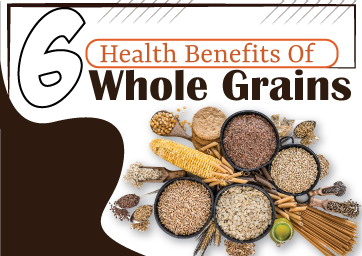Why are Whole Grains Good for You
Whole grains are foods with their entire grain intact, including the bran, germ, endosperm, and pericarp. In simple terms, the nutrients in whole grains are always intact and provide loads of essential vitamins and minerals. They also have far fewer bad calories than refined ones, making them a great addition to your diet.
Let's look at six significant health benefits of whole grains.

1. Whole Grains are Packed with Fiber
Do you know why whole grain bread is healthier for you than white bread?
It's because whole grains are a good source of fiber. They include a lot of fiber, which is necessary for your digestive health. Additionally, fiber can lower the risk of heart disease and other chronic diseases by regulating blood sugar levels. So now that you know whole grain bread benefits, don't forget to buy them instead of white bread next time.
2. Whole Grains Can Help in Weight Loss
Want to lose those extra kilos fast? Whole grains may be helpful.
The high fiber content of whole grains makes you feel fuller for longer. Additionally, you are less inclined to nibble on unhealthy junk food when you are full.
According to studies, those who consume whole grains are less likely to be fat than those who do not. So include whole grains in your diet if you want to reduce weight. You'll be happy that you did.
3. Whole Grains Lower the Risk of Heart Disease and Stroke
Whole grains are the best for heart health. The fact is backed by medical science as well. Studies have shown that consuming whole grains can lower heart disease and stroke risk.
How?
For starters, whole grains are high in fiber, which helps keep your arteries free and lower dangerous cholesterol levels. Additionally, they are a vital source of antioxidants, which help prevent inflammation and oxidative damage.
4. Whole Grains Help Control Your Blood Sugar Levels
One of the most significant advantages of whole grains is their ability to aid with blood sugar regulation. Why is this such a big deal?
Because mismanaging blood sugar levels can lead to more threatening health issues such as Type 2 diabetes, weight gain, and even heart disease.
However, consuming whole grains can maintain stable blood sugar levels and reduce your risk of developing health issues. It has been proven that consuming whole grains can cut type 2 diabetes risk by up to 21%. Pretty impressive, right?
5. Whole Grains May Reduce Cancer Risks
Whole grain nutrients have anti-cancer properties too. According to a study, eating whole grains is associated with a decreased risk of colorectal cancer. Furthermore, a review article published in Nutrition Reviews discovered a link between whole grain-rich diets and a lower risk of breast cancer.
6. Whole Grains Can Help You Live Longer
You've probably heard the proverb, "You are what you eat." It is true, though.
Whole grain nutrients contribute to a longer, healthier life. Fiber promotes good gut health, especially among adults. A healthy gut is essential for general good health.
But whole grains are beneficial for more than just fiber. They are rich in oxidants too. And these oxidants are not lost during cooking as well. These oxidants can help you stay healthy and prevent sickness.
Whole Grains Nutritional Value
Whole grains provide our bodies with fiber, protein, iron, zinc, B vitamins, vitamin E, manganese, selenium, copper, magnesium, phosphorous, and dietary fiber. These nutritional elements help keep us healthy and strong.
Whole grain foods contain more vitamins than their refined counterparts. Because whole grains have not been processed, they retain their natural structure and make them easier to digest and absorb.
Whole grains are higher in dietary fiber, lower in sugar content, and higher in micronutrients than refined grains. Whole grains products are also high in antioxidants, minerals, and phytochemicals that guard us against disease.
● Whole grains are full of protein. One cup of cooked oats contains 8 grams of protein.
● Whole grains are low in fat and calories. A half-cup serving of oatmeal (cooked) provides only 15 calories and 5 grams of fat, making it a perfect snack or meal replacement option.

Types of Whole Grains
Whole grains have been around since prehistoric times. They are grown worldwide and consumed daily by millions of people. Different types of whole grains include wheat, oats, rice, barley, millet, buckwheat, amaranth, quinoa, sorghum, teff, etc.
● Wheat: Wheat is a popular whole grain food that is often referred to as bread. It is a primary staple food for many cultures around the world.
● Brown Rice: Brown rice is an excellent source of fiber. It also has a low glycemic index, which means it won't cause a spike in blood sugar levels.
● White Rice: It is a staple food crop for over half of the world's population. Rice is also frequently used in desserts, snacks, beverages, and side dishes.
● Quinoa: A complete protein, quinoa contains all nine of the essential amino acids. Additionally, it has a lot of fiber, magnesium, and potassium.
● Oats: Oats are a great source of fiber, vitamin B1, and magnesium. They're also gluten-free, which makes them an excellent choice for people with gluten sensitivities.
● Buckwheat: Buckwheat is a fruit seed rich in antioxidants and vitamins. Buckwheat flour is commonly used in Asian cuisine and some European dishes.
● Millet: Millet is a small brown grain that originated in Africa. Other than being nutritious, it is also gluten-free! It is often used as a whole grain alternative to rice.
● Barley: Barley is a cereal grain used for human consumption. It is widely cultivated and serves as a traditional source of food starch and malt.
How to Increase the Consumption of Whole Grains?
There are many different types of whole grains out there. Experiment with these different whole grains to find what works best for you. To add the benefits of whole grains to your diet, follow these tips:
1. Whole Grain Cereals for Breakfast: The day's first meal should be whole grains. Whole grain cereals are nutritious and delicious.
2. Add Whole Grains to Other Meals: They are rich in fiber, protein, filling, and satiating. You will feel energetic and satiated throughout the day. You don't need to change your diet
Try sprinkling brown rice on top of your lunch salad, adding quinoa to your morning oatmeal, or serving whole wheat pasta with dinner.
3. Make swaps: Instead of using refined flour in recipes, switch to whole wheat flour. Use dark chocolate instead of milk chocolate. Swap regular butter for ghee, a clarified butter commonly used in Indian cuisine. And use olive oil instead of vegetable oil.
Who can not Consume Whole Grains?
While most whole grains are generally safe to eat, some people may experience mild side effects. Whole grains take longer to digest and can cause gastrointestinal discomfort. Some people may experience gas after eating certain whole grains. These issues can be overcome by eating whole grains in moderation.
But who can not consume whole grains? Here's what we know:
● People with Celiac Disease
A person with celiac disease should avoid eating whole grains. Celiac disease is a digestive disorder where the body's immune system reacts negatively to gluten, a protein found in wheat, rye, and barley.
● People with Gluten Allergies
Gluten is a general term for several types of proteins found in wheat, rye, barley, and oats. Gluten sensitivity occurs when the immune system overreacts to specific proteins in food, causing inflammation in the intestinal tract. Symptoms include stomach cramps, bloating, and diarrhea.
Final Words
Whole grain foods are often called "good carbs" because they are high in complex carbohydrates that provide sustained energy throughout the day. Complex carbohydrates are broken down into glucose and stored as glycogen in the liver and muscles, giving your body a steady energy supply.
Before you leave, here's a recap of the significant health benefits of Whole Grains:
1. They can help you lose weight or maintain a healthy weight.
2. They can help keep your blood sugar stable.
3. They can protect you from heart disease.
4. They can reduce your risk of cancer.
5. They can improve your gut health.
6. They are high in fiber and nutrients.
Hope you now know more than before about whole grain health benefits. Do some favor to your health. Add whole grains to your diet today !



 Contact Us
Contact Us






 Hospitals
Hospitals
 Doctors
Doctors
 Diagnostic
Diagnostic
 Pharmacy
Pharmacy
 Health Tips
Health Tips
 Blog
Blog



















Comments